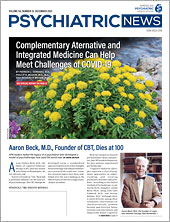Early in the pandemic, convinced that running for exercise would help with stress, I bought new running shoes. But I quickly learned that it takes more than good shoes to be a good runner: It matters how and with whom you train. Similarly, when I prescribe medicines for patients, I have to remember the power of the therapeutic alliance.
When prescribing, I often think of how a medication’s mechanism of action will help a patient. When a patient returns for follow up and reports that a medication is working with fewer troublesome symptoms or improved overall well-being, we may both assume that this is because of the medication’s pharmacological action.
The way that a medication “works,” however, involves much more than the chemical action of the drug in the patient’s body. Indeed, in common conditions like major depressive disorder, the pharmacological action of medication—the difference that shows up in randomized, controlled trials when active agents are compared with placebo—accounts for only a fraction of the patient’s response. If psychiatrists focus only on the chemical action of what we prescribe, we miss the things that account for most of our patients’ improvement.
Some improvement may be attributable to the natural, fluctuating course of mental disorders. Patient-specific factors, such as patients’ expectation that they will improve with treatment, also play a role. But the alliance between physicians and patients is a powerful—and understudied—facilitator of healing. In the National Institute of Mental Health Treatment of Depression Collaborative Research Program study, the response of depressed patients were more related to the particular psychiatrist who treated them than to whether they received imipramine or placebo, and patients of the most effective study psychiatrists achieved more improvement with placebo than patients of the least-effective psychiatrists achieved with imipramine. A more recent meta-analysis showed that the therapeutic alliance accounted for a moderate effect size (z=0.3) on psychopharmacological treatment outcome across multiple diagnoses. In a carefully controlled analysis, researchers found that a strong working alliance at the midpoint of medication treatment for depression predicted future treatment response.
As Abraham Nussbaum, M.D., and I demonstrate in Prescribing Together: A Relational Guide to Psychopharmacology, this evidence reminds us that psychiatrists are not merely dispensers; we are experts who use our training and knowledge to match effective drugs with patients’ mental health symptoms. We are also collaborators who accompany our patients, seeking understanding of their experiences within their life narratives and relationships, and then bringing both medications and the relationship we share with them to the service of healing. As collaborators, we want patients to experience symptom reduction, but also an enhanced capacity for relationships with others, the capacity to act meaningfully toward goals, and the capacity to reflect meaningfully on their lives.
Building effective prescribing relationships requires both experience and learning from wise practitioners. In Prescribing Together, we were able to bring research on the therapeutic alliance into the conversation with accomplished practitioners and researchers such as David Mintz, M.D. (Austen Riggs Center), Kay Redfield Jamison, Ph.D. (Johns Hopkins University), Sidney Hankerson, M.D., M.B.A. (Columbia University), and Sarah Fineberg, M.D., Ph.D. (Yale University). They shared practical strategies for building prescribing relationships that matter.
We detail diagnosis-specific strategies in Prescribing Together, but it starts with core principles for effective prescribing relationships. First, psychiatrists can explore the social and relational contexts in which symptoms arise and validate patients’ experience of these contexts. Second, psychiatrists can ask questions that explore the meaning of particular symptoms for the patient. Third, psychiatrists can orient prescribing to a patient’s goals and not to symptoms alone: a medication may be said to “work” if patients can do things that they were unable to do before. Fourth, psychiatrists can prescribe medications in a way that encourages engagement in effective psychotherapy. Fifth, psychiatrists can remain aware of their own reactions to patients so as to avoid what Dr. Mintz has called “countertransference prescribing.”
Just as competitive runners focus not only on the shoes that they are wearing but also on the technique with which they run and with whom they train, psychiatrists must focus not just on what we prescribe but on the prescribing relationships that we build with patients. It is these relationships, and not just our medications, that help guide our patients on the path to healing. ■

